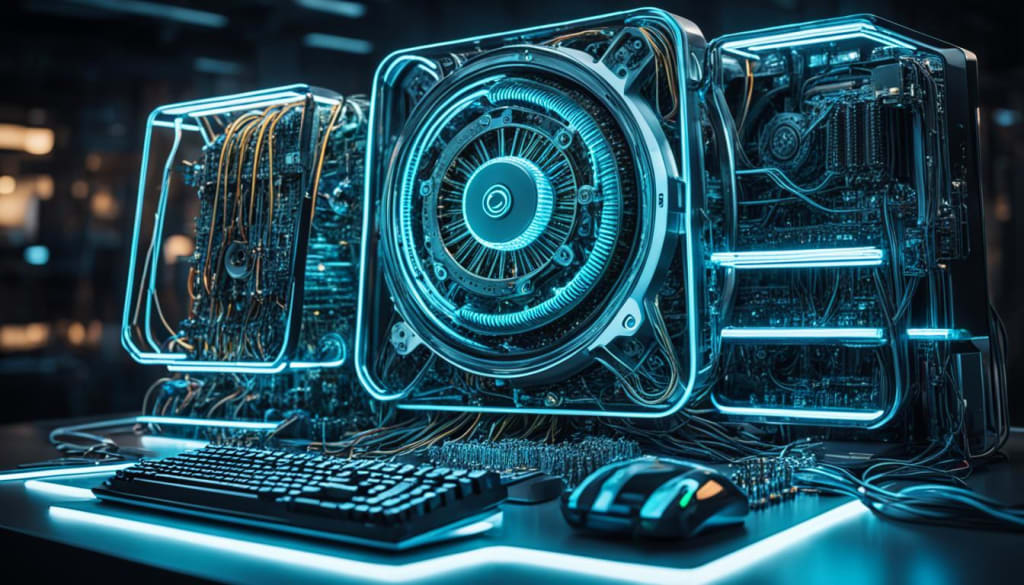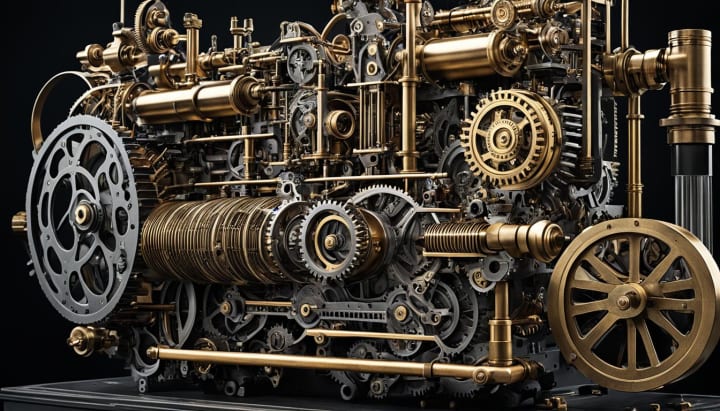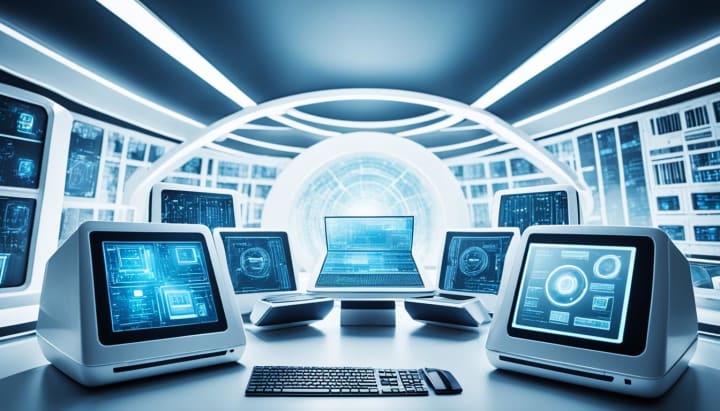History, Concepts, Generation and Classification of Computers
Read the Article to learn more

Reflecting on the evolution of computers fills me with awe. It's a journey from bulky mainframes to sleek devices that fit in our pockets. From mechanical calculators to fast microchips in smartphones, computers have seen constant innovation. This story shows our drive to push technology's limits.
This article will take you through the evolution of computers. We'll explore key concepts, generational changes, and how computers are classified. We'll look at important moments and figures that shaped computing. This will show how computers have changed our society, work, and life.
Key Takeaways
Computers have evolved from mechanical calculators to today's advanced machines.
Their history is a tale of constant innovation, driven by our desire to advance technology.
Knowing about computers' concepts, generations, and classifications helps us understand their impact.
Computers have changed our lives, affecting how we work, communicate, and interact with the world.
The future of computers looks exciting, with new technologies like AI, the internet of things, and cloud computing set to change what's possible.
The Origins of Computers
Computers have a long and interesting history. They started with the work of early inventors and innovators. We'll look at how these pioneers helped create the computers we know today.
Early Computing Devices
The first computers were mechanical and did simple calculations. Devices like the abacus and Pascaline were early steps towards modern computers. These early machines were big and not very powerful. But they set the stage for future tech advances.
The Analytical Engine and Charles Babbage
Charles Babbage was a key figure in computer history. He was an English mathematician and inventor. His idea, the Analytical Engine, was a machine that could do many different tasks.

This machine was meant to be controlled by punch cards. This idea of using cards to store information helped start modern computer programming. Babbage's work and others' laid the groundwork for today's computers. From desktops to smartphones and IoT devices, computers are now a big part of our lives.
"I am not able rightly to apprehend the kind of confusion of ideas that could provoke such a question." - Charles Babbage, on being asked about the usefulness of his Analytical Engine.
Computers: Defining the Concept
Computers are key to our digital lives, touching every part of our daily routines. But what makes a computer a computer? Simply put, it's a device that can do many tasks, from simple math to complex problem-solving. It can take in, store, change, and send out information, changing how we live, work, and talk to each other.
At the heart of a computer are its hardware and software. The hardware includes parts like the processor, memory, and input/output devices. These work together to carry out commands and process data. The software, however, is made up of programs and instructions. It tells the hardware what to do, letting computers do everything from browsing the web to editing videos.
Computers don't just stand alone; they connect with each other through networks. This lets them share information easily. This idea of cloud computing has changed how we use computers. Now, we can store and access data and applications online, making computing more flexible.
Being able to program computers has changed everything. Programming, or coding, is now a key skill. People in fields like software development and data analysis are crucial in shaping our digital world.

Computers are more than just machines; they're tools that help us achieve more. From the first calculators to today's advanced computers, these technologies keep evolving. They're changing our world, opening doors to new possibilities limited only by our dreams.
The Generations of Computers
Computers have changed a lot over the years, bringing new generations that changed how we use technology. From big, old machines to today's small, fast devices, each generation has made big steps forward. These changes have changed the world of computing a lot.
First Generation Computers
In the 1940s and 1950s, the first computers came out. They used vacuum tubes for processing and storing data. These early computers were huge, filled whole rooms, and could only do a little at a time. But they started the journey to better programming and artificial intelligence technologies.
Second Generation Computers
The 1950s to the 1960s brought the second generation of computers. This time, they switched from vacuum tubes to transistors. This made computers smaller, more reliable, and efficient. Transistors also helped create better programming languages and started artificial intelligence research.
Computers have been getting better with each generation. As we keep exploring new tech, we're looking forward to more big changes. These changes will shape how we use artificial intelligence and the digital world.
"The future of computing is in the hands of those who can imagine it."
Computers and Technological Advancements
Computers have been key in driving progress in many areas. They've changed how we communicate, entertain ourselves, and make scientific discoveries. The link between computers and new tech has changed the game.
Computers have greatly changed how we talk to each other. The internet and computer networks let us share info and work together instantly. Now, with cloud computing and web-based software, we can use many digital tools from anywhere, making work easier and more efficient.
Computers have also boosted scientific research and exploration. High-performance computers and advanced software help with complex tasks like simulations and data analysis. This has opened new areas in fields like cybersecurity, cloud computing, and networks. They help us understand weather patterns and develop new medical treatments, changing science and innovation.
Computers have also changed the entertainment world. They offer immersive games and streaming services, changing how we enjoy content. This gives us more control and personal touches in what we watch and play.
As we keep exploring new tech, it's clear that computers will lead the way. They will keep sparking new ideas that shape our future.
"Computers are like the Swiss Army knife of the modern world – their versatility and power have unlocked a world of possibilities."
Classifications of Computers
Computers are a big part of our lives, coming in many shapes, sizes, and uses. Whether you need a powerful machine for AI research or a small device for internet browsing, there's a computer for you. We'll look at the different types of computers, focusing on their purpose and power.
Based on Purpose
Computers are sorted by what they're used for and the tasks they handle. Some common types include:
Desktop computers: These are the usual PCs found in homes and offices. They're used for tasks like writing, browsing the internet, and enjoying media.
Laptops and mobile devices: These are portable computers, like laptops, tablets, and smartphones. They let you work or have fun anywhere.
Servers: These are strong computers that manage network resources, store data, and serve many users or devices at once.
Workstations: These computers are made for tasks like designing with CAD software, editing videos, and scientific research.
Embedded systems: These are computers built into devices like appliances, cars, and machines to control and monitor their actions.
Based on Size and Processing Power
Computers can also be sorted by their size and how powerful they are. This helps us see the differences in what they can do. Some categories based on size and power include:
Supercomputers: These are the most powerful computers, used for tasks like predicting the weather, simulating nuclear reactions, and breaking codes.
Mainframe computers: Bigger and more powerful than regular computers, mainframes are used by big organizations to handle lots of data and support many users.
Minicomputers: These are smaller and cheaper than mainframes but still strong enough for several users and various tasks.
Microcomputers: This includes desktop computers, laptops, and mobile devices. They're the most common type, offering a good mix of size, power, and price.
Knowing about the different types of computers helps us see how they've changed our lives, work, and how we interact with the digital world.
Computers in the Modern Age
Computers are now a big part of our everyday lives. They fit into our work, homes, and even our pockets with smartphones. These machines have changed a lot and are key to our modern world.
At work and in school, computers are essential for getting things done, talking to others, and learning. They've changed how we work, making it easier to work together, keep information, and get information. Software and networks have changed business, finance, and how we stay in touch.
But computers aren't just for work. At home, they're the heart of fun, from watching movies to playing games. Cloud computing makes it easy to keep and get to our stuff, and mobile devices let us carry computing power everywhere.
Using computers more has brought new problems, especially with cybersecurity. We put our personal and work info on these devices, so keeping it safe is very important. Keeping our data safe from hackers is a big issue as computers get more advanced.
Computers have become a big part of our lives. They've changed how we live, work, and talk to each other. They're making big changes in our society.
"Computers are the machines of our time, shaping the way we live, work, and connect with one another."
The Computers Evolution
The story of computers is a tale of amazing changes that have changed our world. From the big vacuum tubes of old to the small microchips of today, computers have come a long way. This journey shows how computer hardware has evolved in incredible ways.
From Vacuum Tubes to Microchips
At the start, computers were huge and filled entire rooms. They used vacuum tubes, which were big, delicate, and used a lot of power and heat. Yet, these early machines set the stage for the modern computers we know today.
Then, technology moved to transistors, which were smaller, more stable, and used less power. This change started the second generation of computers, bringing more power and making computers more accessible.
The big leap came with the microchip, or integrated circuit. Engineers put thousands of transistors on one silicon wafer, making computers smaller, faster, and more powerful. This led to the personal computer, changing how we use technology and making computers a part of our daily lives.
Now, computer hardware keeps getting better with new microprocessors, solid-state drives, and the Internet of Things (IoT). These changes have made computers more powerful and a big part of our lives.
"The digital revolution is far more significant than the invention of writing or even the printing press." - Douglas Engelbart
Looking ahead, it's thrilling to think about how computer hardware will keep changing. It will likely shape how we live, work, and interact with the world in new ways.
Hardware: The Physical Components
Computers have changed our world in big ways. They are made of many physical parts that work together. Let's explore the key parts that make these machines work.
The CPU, or "brain," is at the center of every computer. It does the work and makes things happen. CPUs come in different types, from fast microprocessors to powerful multi-core chips.
Computers also need parts to talk to us and show us things. Keyboards, mice, and touchscreens let us put in data and commands. Displays, printers, and speakers show us what the computer says.
Storing data is important too. Hard disk drives (HDDs) and solid-state drives (SSDs) keep our files and media safe. Random-access memory (RAM) helps computers do many things at once.
New tech like internet of things (IoT) sensors and embedded systems is changing how we live. These parts connect the digital and real worlds in new ways.
"The advancement of technology is based on making it fit in so that you don't really even notice it, so it's part of everyday life." - Bill Gates
Knowing about computer hardware helps us understand technology better. Each part, from the CPU to the devices we use, is important. As technology grows, these parts will get even better and affect our lives more.
Software: The Brain of Computers
Computers have amazing hardware, but it's the software that makes them work. Software is like the "brain" of computers. It's made up of instructions and programs that let computers do lots of things, like word processing and complex simulations.
We'll look at how operating systems and applications change how we use computers. These tools are key to making computers work for us.
Operating Systems and Applications
Every computer's heart is its operating system. Systems like Windows, macOS, and Linux connect the computer's hardware to the user. They manage resources, run programs, and make things easy to use.
These systems support a huge world of software programs and applications. They meet different needs and likes. From Microsoft Office and Google Workspace to Adobe Creative Cloud, there's a lot to choose from.
These applications let users make documents, design graphics, analyze data, and even work in programming and cybersecurity. The list goes on.
Thanks to operating systems and applications, computers are essential in our daily lives. As technology grows, the software in our computers will get even better. This will open up new possibilities and boost our productivity and creativity.
"Software is the magic that makes the hardware come alive." - Bill Gates
In the world of computers and technology, software is what drives progress. It keeps changing how we use and benefit from these powerful machines.
The Impact of Computers on Society
Computers have changed our world, making work, communication, and life easier. They've brought us artificial intelligence, cloud computing, and made cybersecurity more important. Computers touch almost every part of our lives.
Computers and software have changed the job world a lot. Many jobs now use technology a lot. This means we need more people who know about computers and networks. Companies use technology to work better, be more productive, and compete online.
Computers have also changed how we connect with others. We can talk to people all over the world thanks to them. They help us share information and talk to each other in new ways.
"Computers have become indispensable tools in our daily lives, shaping the way we work, learn, and interact with one another."
But, computers and technology also bring challenges. We need strong cybersecurity to keep our data safe. As we use computers and networks more, keeping them safe from cyber threats is very important.
Computers have a big effect on society. We need to use their power wisely and deal with the challenges they bring. By using computers' good sides and fixing their risks, we can make our society better connected, productive, and safe.
Computers and the Future
As we wrap up our exploration of computers, let's look ahead to the exciting future. The world of computing is always changing. New technologies and trends are set to change how we use computers, hardware, and software.
Artificial intelligence (AI) is making big steps forward. AI is improving in areas like understanding language, learning, and seeing images. As AI gets better, it will change our daily lives. It will help us do tasks, make choices, and interact with our computers in new ways.
The Internet of Things (IoT) is another big change. It connects many devices and appliances to the internet. This will change industries, make our homes smarter, and give us new insights. As IoT grows, it will change how we live, work, and see the world.
Cloud computing is also getting better. It's making it easier to use software from anywhere. This means we can work together better, access our stuff from anywhere, and have smoother experiences across devices.
"The future of computing is not about the hardware or the software, it's about the human experience." - Satya Nadella, CEO of Microsoft
Looking ahead, the future of computers is full of big changes. We'll see more AI, IoT, and cloud computing. These changes will deeply transform computing. By keeping up with these trends, we can use computers to their fullest and shape the future of tech.
Conclusion
Our journey through the world of computers has been fascinating. It shows how these machines have evolved and changed our lives. From simple devices to today's powerful computers, their story is one of constant innovation and big changes.
Early pioneers like Charles Babbage set the stage for today's computers. Now, computers are everywhere, changing how we live, work, and communicate. They've made accessing information and staying connected easier than ever.
Looking ahead, we see big changes coming with artificial intelligence, the Internet of Things, cloud computing, and mobile tech. Computers will keep shaping our world. They will help us solve big problems, make new discoveries, and change how we live and work. I'm excited to see what the future holds for these amazing machines.
FAQ
What are the origins of computers?
Computers started with early devices like Charles Babbage's Analytical Engine in the 19th century. These early innovators set the stage for today's computers.
How are computers defined and what are their key components?
Computers are all about processing and storing data and running programs. They have a CPU, memory, and other hardware and software parts.
What are the different generations of computers?
Computers have gone from big, vacuum-tube machines to today's sleek, microprocessor devices. There are several generations, each with big tech leaps.
How have computers contributed to technological advancements?
Computers have been key in driving tech progress, from communication to science. They've grown with other technologies, creating a strong link between them.
What are the different classifications of computers?
Computers vary by purpose, size, and power. We have personal, mainframe, supercomputers, and mobile devices, each for different needs.
How have computers become ubiquitous in modern life?
Now, computers are everywhere, from work to our pockets with smartphones. They've changed how we talk, work, and see the world.
What are the key hardware components of a computer?
A computer's main parts are the CPU, memory, storage, and input/output devices. These work together to make the digital world run.
What is the role of software in computers?
Software makes computers smart, letting them do lots of tasks. It includes operating systems and apps that help computers work, from simple tasks to complex ones.
How have computers impacted society?
Computers have changed jobs, communication, and culture. They've changed how we work, learn, and connect with others, affecting our daily lives a lot.
What are the future trends and technologies in the world of computers?
The future is exciting with new tech like AI, the Internet of Things, and cloud computing. These will change how we use computers and interact with the digital world.
About the Creator
Signor Wilson
I'm Signor Wilson, a passionate content creator, YouTuber, blogger, and poet. I love exploring different avenues of creative expression and sharing my insights with the world.
Enjoyed the story? Support the Creator.
Subscribe for free to receive all their stories in your feed. You could also pledge your support or give them a one-off tip, letting them know you appreciate their work.






Comments
There are no comments for this story
Be the first to respond and start the conversation.